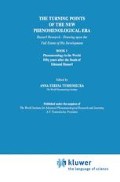Abstract
The evolution of Edmund Husserl’s views is a complicated tangle of psychologistic and antipsychologistic themes. With the main task of philosophy being considered by him to be that of laying the foundations for science, the founder of phenomenology was well aware of the closeness of his doctrine to psychology, and he was concerned with the elucidation of the nature of this closeness during the whole of his scholarly career.
Access this chapter
Tax calculation will be finalised at checkout
Purchases are for personal use only
Preview
Unable to display preview. Download preview PDF.
Notes
E. Husserl, Logische Untersuchungen, Bd. 1 (Halle: M. Niemeyer, 1922). p. 12.
E. Husserl, Formale und transzendentale Logik (Halle: M. Niemeyer, 1929), p. 9.
E. Husserl, Ideen zu einer reinen Phänomenologie und phänomenologische Philosophie, Drittes Buch, Husserliana 5 (The Hague: M. Nijhoff, 1952), p. 68.
E. Husserl, Logische Untersuchungen, Bd. 1 (Halle: M. Niemeyer, 1922), p. 36.
E. Husserl, Philosophie der Arithmetik, Bd. 1 (Halle: 1891), p. 16.
E. Husserl, Logische Untersuchungen, Bd. 1 (Halle: M. Niemeyer, 1922), p. 65.
E. Husserl, Ideen I (Halle: M. Niemeyer, 1913), p. 9.
E. Husserl, Logische Untersuchungen, Bd. 1 (Halle: M. Niemeyer, 1922), p. 240.
E. Husserl, Logische Untersuchungen, Bd. 1 (Halle: M. Niemeyer, 1922), pp. 108–109.
E. Husserl, Logische Untersuchungen, Bd. 1 (Halle: M. Niemeyer, 1922), p. 344.
E. Husserl, Logische Untersuchungen, Bd. 1 (Halle: M. Niemeyer, 1922), y. 21.
E. Husserl, Logische Untersuchungen, Bd. 1 (Halle: M. Niemeyer, 1922), p. 42.
E. Husserl, Phänomenologische Philosophie, Husserliana 9 (The Hague: M. Nijhoff, 1962), pp. 312–313.
E. Husserl, Die Krisis der europäischen Wissenschaften und die transzendentale Phänomenologie, Husserliana 6 (The Hague: M. Nijhoff, 1954), p. 258.
E. Husserl, Phänomenologische Philosophie, Husserliana 9 (The Hague: M. Nijhoff, 1962), pp. 335–336.
E. Husserl, Die Krisis der europäischen Wissenschaften und die transzendentale Phänomenologie, Husserliana 6 (The Hague: M. Nijhoff, 1954), pp. 259–260.
E. Husserl, Phänomenologische Philosophie, Husserliana 9 (The Hague: M. Nijhoff, 1962), p. 96.
It seems that just this indistinguishability led to the controversy between Ingarden and Husserl. Cf. my paper, “The Ingarden — Husserl Controversy: The Methodological Status of Consciousness in Phenomenology and the Limits of the Human Condition” Analecta Husserliana. Vol. XXVII, pp. 209–221.
Cf. A-T. Tymieniecka, Logos and Life, Creative Experience and the Critique of Reason (Dordrecht: Kluwer, 1988), p. 6.
E. Husserl, Die Krisis der europäischen Wissenschaften und die transzendentale Phänomenologie, Husserliana 6 (The Hague: M. Nijhoff, 1954), pp. 267–268.
Editor information
Editors and Affiliations
Rights and permissions
Copyright information
© 1991 Springer Science+Business Media Dordrecht
About this chapter
Cite this chapter
Sodeika, T. (1991). Psychologism and Description in Husserl’s Phenomenology. In: Tymieniecka, AT. (eds) The Turning Points of the New Phenomenological Era. Analecta Husserliana, vol 34. Springer, Dordrecht. https://doi.org/10.1007/978-94-011-3464-4_15
Download citation
DOI: https://doi.org/10.1007/978-94-011-3464-4_15
Publisher Name: Springer, Dordrecht
Print ISBN: 978-94-010-5533-8
Online ISBN: 978-94-011-3464-4
eBook Packages: Springer Book Archive

